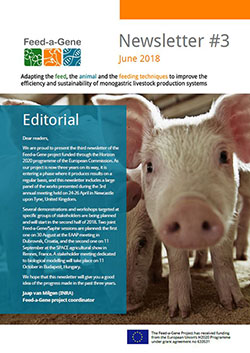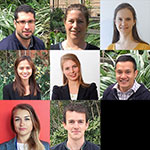Feed-a-Gene Newsletter #3
Click here to download the Feed-a-Gene newsletter #3
Welcome to the third Feed-a-Gene newsletter
We are proud to present the third newsletter of the Feed-a-Gene project funded through the Horizon 2020 programme of the European Commission. As our project is now three years on its way, it is entering a phase where it produces results on a regular basis, and this newsletter includes a large panel of the works presented during the 3rd annual meeting held on 24-26 April in Newcastle upon Tyne, United Kingdom. Several demonstrations and workshops targeted at specific groups of stakeholders are being planned and will start in the second half of 2018. Two joint Feed-a-Gene/Saphir sessions are planned: the first one on 30 August at the EAAP meeting in Dubrovnik, Croatia, and the second one on 11 September at the SPACE agricultural show in Rennes, France. A stakeholder meeting dedicated to biological modelling will take place on 11 October in Budapest, Hungary. We hope that this newsletter will give you a good idea of the progress made in the past three years.
Jaap van Milgen (INRA), Feed-a-Gene project coordinator
Third Feed-a-Gene Annual meeting, Newcastle upon Tyne, United Kingdom
The third annual meeting of the Feed-a-Gene project took place on 24-26 April 2018 in Newcastle upon Tyne, United Kingdom. It was hosted by the Newcastle University, one of the project partners. The meeting was attended by 68 people. During this meeting, Feed-a-Gene partners presented the work done so far, shared their results and planned activities for the next year. All attendees appreciated the organization of the meeting by Prof. Ilias Kyriazakis and his team at University of Newcastle. Feed-a-Gene project coordinator Jaap van Milgen and project manager Vincent Troillard would like to thank all the people at UNEW who made this meeting possible and enjoyable.
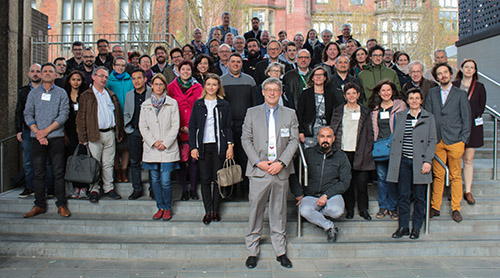
Progress reports for the Feed-a-Gene project
Much progress has been made in the third year of the Feed-a-Gene project. Click on the following links to read the progress reports for each work package.
- Alternative feed ingredients and real-time characterisation (WP1)
- Identification of feed efficiency traits related to individual diversity (WP2)
- Modelling feed use mechanisms and animal response to nutrient supply and environmental challenges (WP3)
- Management systems for precision feeding to increase resilience to fluctuating environments (WP4)
- Use of new traits in animal selection (WP5)
- Sustainability assessment of production systems (WP6)
- Dissemination, training and technology transfer (WP7)
Nine young researchers in the spotlight
The 3rd annual meeting of Feed-a-Gene included oral presentations from young talented researchers whose work received funding by the H2020 programme.
- Antonio Brandao Melo (IRTA): Rapeseed meal and enzyme supplementation on growth performance and nutrient digestibility in pigs
- Samantha Joan Noel (Aarhus University): Development of models to predict the nutritional value of feedstuffs and feed mixtures by NIR
- Mathilde Le Sciellour (INRA): Relationship between microbiota composition and nutrient digestibility, effect of dietary fibers
- Aira Maye Serviento (INRA): Short- and long-term effects of DON challenge on the performance and feeding behaviour of finishing pigs
- Lisanne Verschuren (Topigs Norsvin): Plasma metabolites related to nitrogen efficiency in grower-finisher pigs
- Hieu Nguyen Ba (INRA): On the use of voluntary feed intake for automatic detection and characterization of the response of growing pigs to perturbations
- Galyna Dukhta (Kaposvar University): Application of a pig model to predict broiler performance
- Raphaël Gauthier (INRA): Precision feeding development for lactating sows: nutritional requirements modelling
- Frédéric Jehl (INRA): Genetics component of feed efficiency in layers using DNA-seq and RNA-seq: preliminary results
Stakeholder session at the 68th EAAP annual meeting, Tallinn, Estonia, 30 August 2017
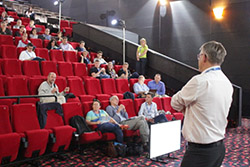
A stakeholder session was organised during the EAAP meeting in Tallinn in August 2017. It was attended by about 120 people. The session included 16 oral presentations and 3 posters, a demonstration of the biological modelling DSS (WP3) by Masoomeh Taghipoor (INRA) and a discussion with the stakeholders.
Feed for thoughts from the session
- If Warren Buffett wanted to invest in microbiota in order to influence animal performance in a positive way, should he put 10 million in feed company or 10 million in genetics or 50/50? Jaap van Milgen, INRA
- Is the microbiome a result of an animal, its diet or environment, or does it have causal effect on animal? If it is causal, then the indicators of the microbiome are a good way to control the levers that are working. But, if it is just a consequence, why do we look at the microbiota at all? Jaap van Milgen, INRA
- Experimental design is going to be very important to you. People are going to transplant microbiome from an animal to another which seems to be easy to do. If you can set up cross design don’t worry. It seems that experimental designs are embryonic at the moment. Wait a couple of years for people to make mistakes that way and learn from that. We do not have enough data to figure out how to do it properly, we need more mistakes. Pieter Knap, Genus-PIC
- The main part in these discussions is understanding what is going on and how to approach that. This may be experimental design, this may be increasing data sets, but the main thing about metabolomics is, yes, we can measure everything, but do we know what we are looking at? Lisanne Verschuren, Topigs Norsvin
- Maybe we could have a look at human medicine where biomarkers were studied for diagnosis of different pathologies and, in fact, it has been successful only with very large sets of subjects to be analysed… We don’t have to understand the mechanisms, we just have to find the biomarkers. We have to dissociate research of biomarkers and the understanding of the phenotypes. Florence Gondret, INRA
Upcoming events and roadmap for demonstrations and workshops
Feed-a-Gene researchers will present communications in the following congresses in 2018:
- DPP Digestive Physiology of Pigs, 21-24 August 2018, Brisbane, Australia
- EAAP 2018, 27-31 August 2018, Dubrovnik, Croatia. There will be a full day joint session Feed-a-Gene/SAPHIR on 30 August with 16 communications and two discussion panels.
- SPACE 2018, 11-14 September 2018, Rennes, France. There will be a joint Feed-a-Gene/SAPHIR conference on 11 September. A live demonstration of the Decision Support System for precision feeding will take place at the INRA booth during the week.
- EPC European Poultry Conference, 17-21 September 2018, Dubrovnik, Croatia
- Feed Additives Global 2018, 26-28 September 2018, Amsterdam, Netherlands. On 26 September: The Future of Precision Livestock Farming (Ludovic Brossard, INRA)
- EuroTier 2018, 13-16 November 2018, Hanover, Germany
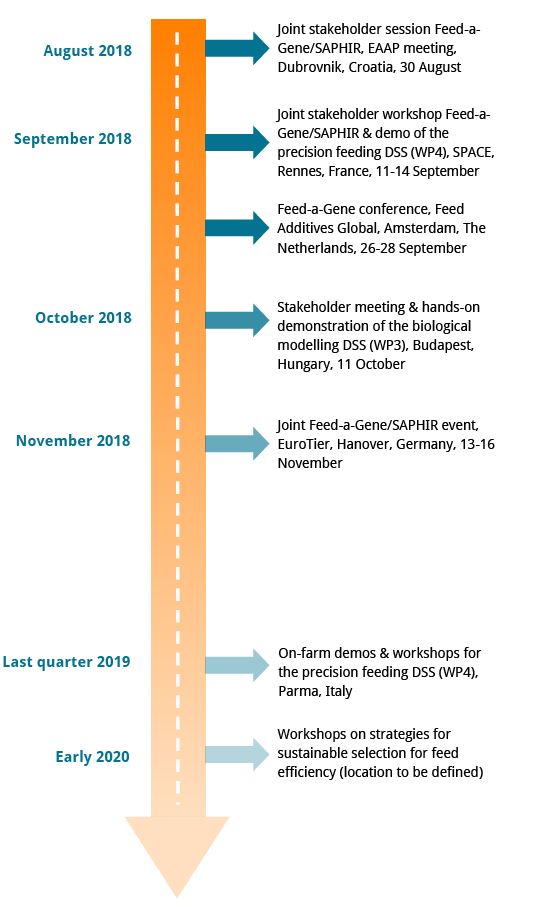
Information on data protection and privacy
Your privacy is important to Feed-a-Gene and we take our responsibility regarding the security of your personal information very seriously. On the 25th May 2018, a new data protection law, the General Data Protection Regulation (GDPR), came into effect in Europe. The GDPR gives you more control over your personal data as well as greater transparency around how it is used. To give you more information about how we collect, use and store your personal data, we have updated our Privacy Policy.
You are subscribed to receive our email newsletters. If you are happy to receive these emails you don’t need to do or change anything. You will always be given the option to unsubscribe at the bottom of the emails we send you, or you can log in with your account and unsubscribe from there.

